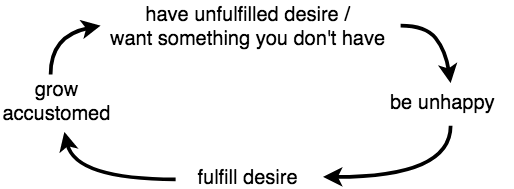This post will outline the first three of the core lessons I took from “A Guide to the Good Life” by William Irvine.
Tranquility & Virtue
At the core of stoic philosophy stand the concepts of Tranquility and Virtue.
Tranquility is described as the “psychological state marked by the absence of negative emotions”, such as grief, anger or anxiety. However, this is not a zombie-esque state of “not feeling anything”, but instead the presence of positive emotions, untainted by negative ones.
Interestingly, Tranquility and Virtue are symbiotic. If you are not tranquil, your mind will be distracted by the negative emotions and your judgement will be less reasonable. This in turn prevents you from moving towards Virtue. Your emotions triumph over your intellect.
Adversities
Challenges and adversities in life are reframed into a sparring-like context. If fate hits you hard, you should regard it as a type of training situation.
Adversities we encounter in life are mere training. These things that we shudder and tremble at are for the good of the persons to whom they come.
We can observe how application of this thought changes emotional responses. Instead of being frustrated and resenting an unfortunate event (note how these are all negative emotions), you shall view the broken Nutella jar and lost Love as an opportunity to practice your Virtue.
Negative visualization
Contemplating bad things happening to you is powerful. Why?
Firstly, and less importantly, it helps you be mentally prepared if fate strikes. However, the more interesting effect of imagining yourself getting fucked over in every imaginable fashion, is that you start appreciating not being fucked in these ways.
Let me elaborate.

Usually, things go a little like this: You have quite a lot of stuff. If you’re reading this, I’m assuming that you at least have access to the internet. But you’re pretty much used to it at this point. And chances are, you want something right now, would just love to have it! Nothing would make you happier. Be it that slick new piece of tech gadget, that girl or boy next door looking so damn fine, a new pair of shoes. And I’ll be bold and state that after you get it, you’ll eventually lose your appreciation for it and it’ll stop giving you joy. This is natural, we adapt, even to what we have.
We are also dopamine junkies (the stuff in your brain that gives you that rush when you get something new). When our appreciation wears off and we grow accustomed to the thing we just wanted so much, we eventually want something new to give us a new rush. We start chasing the next thing.
Stoics think that we can rejuvenate our passion for the things we already have by imagining how it would be to lose them. This does not mean getting pessimistic or even fatalistic. This means realizing that you’re not entitled to have all these nice things.
All we have is on loan from Fortune, which can reclaim it at any time, and without advance notice.
This lets us re-learn to appreciate what we have. By that, we can cut the cycle of wanting and chasing the next thing in pursuit of satisfaction short. It puts our first world problems into perspective.
Again, observe how this lends itself to attaining Tranquility by taking away the negative emotion of being unfulfilled because you don’t have the new iPhone X, and replacing it with the gratitude for having a phone that allows you to talk to your loved ones from anywhere.
Choosing your battles
The core of the next lesson is categorizing things you do and face into three categories.

If you have complete control over something, engage with it fully. No one can keep you from succeding but yourself.
In contrast, if you have no control, your actions have no impact on the outcome at all. All effort invested is wasted. Therefore, you should not be concerned with it.
The category right between those, to me, is the most interesting.
Internal & external goals
Suppose you’re really ambitious in playing a sport. You play a match, try really hard and still, you lose. Pretty upsetting, right? Notice what your frame of mind is when you focus on the outcome of winning. This outcome is not fully within your control. Your training efforts and how focused you are improve your chances of winning, but you cannot be sure. Call this an external goal.
If you are really attached to being the winner, failing to win will be crushing. It will disrupt your Tranquility. Furthermore, if you’re behind on that match, you will probably get frustrated and play worse.
Now contrast this mindset with someone who plays with the goal of playing to the best of his / her ability and trying to get better. This goal is way farther within your control. Call this an internal goal. Even if you lose the game, you can attain your personal goal and retain your Tranquility. Additionally, playing your best will support your chances of eventually getting to win!
Internalizing your goals is advisable for matters that are not fully controllable by you. This isolates you from the negative emotions of uncontrollable outcomes. Meanwhile, you move forward.
Let’s wrap up for now, hope this was useful to you. I’ll see you on the other side.